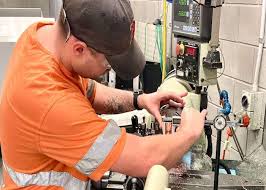Are you a student trying to find out what types of engineering courses are available in South Africa? If so, you may be interested in pursuing a broad, ever-evolving field that pushes individuals and groups to provide safer, quicker, and better answers to some of the most pressing problems facing our planet.
From industrial, electrical, and mechanical engineers to civil and chemical engineers, there are many different kinds of engineering. Additionally, there are subfields within each of these areas, ranging from information technology and textiles to aircraft and transportation.
This article offers a detailed straightforward explanation of the different types of engineering courses offered in South Africa, with their requirements, importance, and fees.
Table of contents
- Types of Engineering Courses in South Africa
- #1. Civil Engineering
- 2. Mechanical Engineering
- 3. Electrical and Electronic Engineering
- 4. Chemical Engineering
- 5. Computer and Software Engineering
- 6. Mining Engineering
- 7. Industrial Engineering
- 8. Agricultural Engineering
- 9. Aeronautical and Aerospace Engineering
- 10. Biomedical Engineering
- 11. Environmental Engineering
- 12. Mechatronics Engineering
- 13. Petroleum Engineering
- 14. Marine Engineering
- 15. Geological Engineering
- 16. Energy Engineering
- 17. Engineering Course Requirements in South Africa
- Fee Structures for Engineering Courses in South Africa
- Benefits of Studying Engineering Courses in South Africa
- FAQs
- Conclusion
- Reference
- Recommendations
Types of Engineering Courses in South Africa
Here’s an explanatory list of types of engineering courses in South Africa:
#1. Civil Engineering
As one of the oldest engineering specialities, the civil engineering course is concerned with the planning, building, and maintenance of infrastructure projects because it focuses mainly on buildings, bridges, roads, and dams. Technical institutions and universities in South Africa provide courses that focus on:
The goal of structural engineering is to design and analyze structures and buildings to guarantee their longevity and safety.
Highways, railroads, and other effective transportation systems are planned and built by transportation engineers.
Projects including flood control, wastewater treatment, and water delivery systems are the main focus of water resource engineering.
Environmental engineering addresses the effects of building projects on the environment and encourages sustainable methods.
Furthermore, Civil engineers are essential to South Africa’s development because the country needs better infrastructure.
See also: Top 15 Carpentry Courses in South Africa | 2025 Cost and Requirements
2. Mechanical Engineering
Mechanical engineering focuses on designing, manufacturing, and maintaining mechanical systems and machines. South African universities offer courses that cover:
The study of thermodynamics examines the connection between work, energy, and heat.
Fluid mechanics is the study of how gases and liquids behave when moving.
The field of robotics and automation is concerned with creating industrial robotic systems.
The field of energy systems focuses on developing sustainable energy sources.
Furthermore, The industrial sectors of South Africa are in great need of mechanical engineers, from the production of automobiles to renewable energy systems.
3. Electrical and Electronic Engineering
In the era of technology, electrical and electronic engineering are essential. Electronic engineering concentrates on circuit and device design, whereas electrical engineering handles power generation and delivery. Important areas consist of:
Power systems are concerned with producing and distributing electricity.
Control Systems: Focuses on automating operations in industries.
Data transmission, internet systems, and mobile networks are all included in telecommunications.
Integrated Systems: Makes smart devices by combining software and hardware.
Why it’s important Knowledge in these areas becomes increasingly important as South Africa’s energy and technology sectors continue to grow.
4. Chemical Engineering
Chemical engineering is the use of chemical processes to produce fuels, plastics, and medications. The following are taught in South African universities:
Process Engineering: Improving industrial processes for sustainability and efficiency;
Biochemical Engineering: Integrating chemistry and biology to produce pharmaceuticals and biofuels;
Materials Science: Investigating material properties to create new products;
Environmental Engineering: Reducing pollution and creating environmentally friendly production techniques.
Why it matters: Chemical engineers play a major role in South Africa’s mining, energy, and manufacturing sectors.
5. Computer and Software Engineering
With the rise of digital technologies, computer and software engineering are increasingly popular. These fields focus on designing, developing, and maintaining software systems and hardware devices. Courses cover:
Programming and Software Development: Creating applications and systems using programming languages.
Cybersecurity: Protecting systems from cyber threats.
Artificial Intelligence (AI): Developing smart systems capable of learning and decision-making.
Data Science: Analyzing large datasets to derive insights.
Meanwhile, South Africa’s growing tech industry relies on skilled engineers to drive innovation.
6. Mining Engineering
South Africa has a rich history in mining, making mining engineering a wide discipline because they focuses on extracting minerals efficiently and safely. Courses include:
Mine Design: Planning and developing mines for optimal extraction.
Mineral Processing: Separating valuable minerals from ore.
Mine Safety: Ensuring safe working environments in mining operations.
Environmental Management: Reducing the environmental impact of mining activities.
Mining engineers play a vital role in South Africa’s economy by optimizing the mining process and ensuring sustainability.
7. Industrial Engineering
Industrial engineering focuses on optimizing complex systems, processes, and organizations. South African universities teach:
Operations Research: Analyzing and improving production systems.
Supply Chain Management: Managing the flow of goods and services.
Human Factors Engineering: Designing systems that consider human capabilities and limitations.
Lean Manufacturing: Reducing waste while maintaining quality.
Industrial engineers help businesses increase efficiency, productivity, and profitability.
8. Agricultural Engineering
Agricultural engineering combines engineering principles with agricultural practices to improve food production. South African courses focus on:
Irrigation Systems: Designing systems to water crops efficiently.
Farm Machinery: Developing and maintaining equipment used in farming.
Soil and Water Conservation: Protecting resources for sustainable agriculture.
Renewable Energy in Agriculture: Implementing solar and wind energy on farms.
Agricultural engineering focuses on agricultural practices because with South Africa’s agricultural sector facing challenges like drought, agricultural engineers are essential for sustainable farming.
9. Aeronautical and Aerospace Engineering
Aerospace and Aeronautical engineering are both included in the much larger area of aerospace engineering. Aeronautical engineering focuses on aeroplanes operating in Earth’s atmosphere, whereas aerospace engineering involves spacecraft and space exploration. South African institutions offer:
Aerodynamics: Studying how air interacts with moving objects.
Propulsion Systems: Designing engines for aircraft and rockets.
Avionics: Developing electronics for navigation and communication.
Space Systems Engineering: Planning and building satellites and space missions.
South Africa’s involvement in space exploration and aviation industries creates opportunities for engineers in this field.
10. Biomedical Engineering
Biomedical engineering combines engineering principles with medical sciences to improve healthcare. Courses in South Africa cover:
Medical Device Design: Creating devices like pacemakers and prosthetics.
Imaging Systems: Developing technologies like MRI and X-ray machines.
Biomaterials: Designing materials compatible with the human body.
Healthcare Systems Engineering: Optimizing hospital and healthcare operations.
As South Africa’s healthcare sector evolves, biomedical engineers contribute to improved patient care.
11. Environmental Engineering
Environmental engineering uses engineering and scientific principles to maintain and develop the environment to safeguard human health, preserve the ecosystems that benefit humanity, and increase the quality of human existence in the environment. It courses focus on:
Pollution Control: Reducing industrial emissions and waste.
Renewable Energy: Designing systems for solar, wind, and hydroelectric power.
Water Quality Management: Ensuring safe drinking water and wastewater treatment.
Climate Change Mitigation: Developing strategies to combat global warming.
Environmental engineers play a crucial role in creating a sustainable future for South Africa.
12. Mechatronics Engineering
Mechatronics combines mechanical, electrical, and software engineering to create smart systems. South African universities offer:
Automation Systems: Designing machines for manufacturing.
Robotics: Developing robots for industrial and personal use.
Sensor Technology: Creating devices that interact with their environment.
Control Engineering: Ensuring machines operate safely and efficiently.
Mechatronics engineers are vital for South Africa’s transition to advanced manufacturing technologies.
13. Petroleum Engineering
Petroleum engineering focuses on extracting oil and gas efficiently. Courses in South Africa cover:
Reservoir Engineering: Analyzing underground reservoirs to maximize extraction.
Drilling Engineering: Designing and managing drilling operations.
Production Engineering: Managing the flow of oil and gas from wells.
Health, Safety, and Environment (HSE): Ensuring safe and eco-friendly operations.
South Africa’s energy sector relies on petroleum engineers for sustainable energy solutions.
14. Marine Engineering
This engineering course is also part of the types of engineering courses in South Africa.
Marine engineering focuses on designing and maintaining ships, submarines, and other marine structures. South African institutions teach:
Naval Architecture: Designing ships for efficiency and safety.
Marine Propulsion Systems: Developing engines and power systems for vessels.
Offshore Engineering: Building and maintaining offshore oil rigs and wind farms.
Ocean Engineering: Addressing challenges like wave energy and underwater construction.
With South Africa’s extensive coastline, marine engineers are key to advancing maritime industries.
15. Geological Engineering
Geological engineering combines geology and engineering to explore and manage Earth’s resources. They are concerned with the detailed technical analysis of earth material and the risk assessment of geological hazards. Courses in South Africa include:
Exploration Geology: Identifying and assessing mineral resources.
Geotechnical Engineering: Ensuring the stability of soil and rock for construction.
Hydrogeology: Studying underground water resources.
Environmental Geology: Addressing environmental impacts of resource extraction.
Geological engineers support South Africa’s resource-based economy while promoting sustainable practices.
16. Energy Engineering
Energy engineering focuses on creating efficient energy systems. These engineers create methods that enhance energy use and consumption because they reduce costs and their impact on the environment by implementing green solutions through research, design, documentation, and construction. Energy engineering courses include:
Renewable Energy Systems: Developing solar, wind, and hydroelectric technologies.
Energy Storage Solutions: Designing batteries and other storage devices.
Energy Efficiency: Optimizing systems to reduce energy consumption.
Fossil Fuels: Exploring ways to extract and use coal and gas more sustainably.
Energy engineers are central to South Africa’s efforts to achieve energy security and sustainability.
See also: Northlink College Courses | 2025 Fee Structures
17. Engineering Course Requirements in South Africa
Students must fulfil certain academic and non-academic requirements to enroll in an engineering course in South Africa because it depends on the curriculum and institution.
Minimum Admission Requirements for Undergraduate Engineering Courses
A National Senior Certificate (NSC) with a bachelor’s pass.
Minimum scores in Mathematics, Physical Science, and English (usually around 60–70%).
Some institutions may require an Admission Point Score (APS) of 28 or higher.
Additional Requirements
Good problem-solving and analytical skills.
Proficiency in computer usage may be beneficial.
Postgraduate Engineering Programs
Master’s Degree
A relevant Bachelor of Engineering (BEng) or Bachelor of Science in Engineering (BScEng).
Strong academic performance in undergraduate studies (usually a minimum 65% average).
PhD Programs
A Master’s degree in engineering or a related field.
Research proposal submission and approval.
Diploma and Certificate Courses
See also: Popular Courses that are in Demand in South Africa | Cost and Requirements
Fee Structures for Engineering Courses in South Africa
The cost of engineering courses varies based on the type of institution (public or private), program level, and duration. Below is a general guide:
Public Universities
Undergraduate Programs:
Annual fees range from ZAR 35,000 to ZAR 70,000.
Postgraduate Programs:
Master’s programs: ZAR 40,000 to ZAR 90,000 per year.
PhD programs: ZAR 30,000 to ZAR 70,000 annually, often with scholarships available.
Private Institutions
Undergraduate Programs:
Annual fees range from ZAR 60,000 to ZAR 120,000.
Postgraduate Programs:
Master’s programs: ZAR 80,000 to ZAR 150,000 per year.
Technical and Vocational Education and Training (TVET) Colleges
Diploma Courses:
Annual fees range from ZAR 10,000 to ZAR 30,000.
These institutions are more affordable but cater to practical, hands-on engineering education.
Scholarships and Financial Aid
Many universities offer merit-based and need-based scholarships.
Organizations like the National Student Financial Aid Scheme (NSFAS) provide funding for eligible students.
Some companies in the mining and manufacturing sectors sponsor engineering students in exchange for work commitments after graduation.
See also: List of Stellenbosch University Courses | Fee Structure
Benefits of Studying Engineering Courses in South Africa
Here are the benefits of studying engineering courses in South Africa:
Global Recognition
South African universities are internationally accredited and recognized.
Access to Advanced Facilities
Engineering schools are equipped with modern labs and industry-relevant tools.
Career Opportunities
Graduates have strong prospects in industries like mining, construction, manufacturing, and renewable energy.
Affordability
South African colleges provide high-quality education at considerably lower prices than those in North America or Europe.
Diverse Specializations
Students can choose from a wide range of specializations tailored to their interests and the country’s industrial needs.
FAQs
It takes 3-4 years to graduate a B. Eng. degree. The Bachelor of Engineering degree is academically equal to the Bachelor of Science.
Engineers and ICT professionals are the most in-demand skills that large corporations and multinational employers struggle to recruit for smooth business operations in South Africa.
The Department of Civil Engineering offers a 4-year Bachelor of Science (Eng) in Civil Engineering.
The Bachelor of Engineering (B. Eng. or BE) is an academic degree achieved for undergraduate studies in one of the Engineering Sciences.
Engineering professions typically fall under four different types: chemical, civil, electrical and mechanical engineering.
Conclusion
From advanced biomedical technology to civil infrastructure, the types of engineering courses offered in South Africa are tailored to an extensive selection of interests and professional goals. The rigorous admissions requirements guarantee that students are well-equipped to meet the industry’s expectations.
Also, there are options for financial help to make college affordable, however fee systems differ.
By going through this article, you will find that South Africa is a great place for prospective engineers to study because of its strong educational system and expanding businesses.
Reference
- Nu.edu – Types of Engineering: What Are They? Everything Explained
- Education.com– 10 Engineering programs in South Africa
Recommendations
- 10 Best Civil Engineering Courses in South Africa | Cost and Requirements
- Nelson Mandela University Courses | Fees Structures
- 15 Best Counselling Courses in South Africa | Cost and Requirements
- Top 15 Social Worker Courses in South Africa | Cost and Requirements
- 10 Best Nated Courses in South Africa | Cost and Requirements






